Entrepreneurship and Small Business Report: Economic Impact and Traits
VerifiedAdded on 2022/12/28
|18
|5264
|53
Report
AI Summary
This report delves into the multifaceted world of entrepreneurship and small businesses, providing a comprehensive overview of various venture types, including small business, scalable entrepreneurship, large company entrepreneurship, and social entrepreneurship. It explores the similarities and differences between these ventures, focusing on their objectives, employee structures, scales of operation, and profit generation. The report further investigates the impact of micro and small businesses on the economy, presenting statistical data on their contribution to employment and turnover in the UK. It also examines the significance of small businesses and start-ups in fostering the growth of the social economy, highlighting their roles in innovation, climate change adaptation, and employment generation. Additionally, the report discusses the distinguishing traits and skills of successful entrepreneurs, drawing on a case study of the Issa Brothers, and analyzing how background and experience can influence entrepreneurial success.

Entrepreneurship and Small
Business
Business
Paraphrase This Document
Need a fresh take? Get an instant paraphrase of this document with our AI Paraphraser

Table of Contents
INTRODUCTION .........................................................................................................................3
Task 1...............................................................................................................................................3
Different kinds of entrepreneurial ventures and their relation with classification of
entrepreneurship...........................................................................................................................3
Similarities and differences between entrepreneurial ventures....................................................5
Task 2...............................................................................................................................................6
Impact of micro and small business on economy........................................................................6
Importance of small businesses and business start-ups to the growth of the social economy.....9
Task 3.............................................................................................................................................11
Distinguishing traits and skills of prospering entrepreneurs that distinguish them from other
business directors.......................................................................................................................11
Entrepreneurial personality reflecting entrepreneurial motivation and mind-set......................12
Task 4.............................................................................................................................................14
How background and experience can hinder or foster entrepreneurship...................................14
CONCLUSION..............................................................................................................................16
REFERENCES..............................................................................................................................18
INTRODUCTION .........................................................................................................................3
Task 1...............................................................................................................................................3
Different kinds of entrepreneurial ventures and their relation with classification of
entrepreneurship...........................................................................................................................3
Similarities and differences between entrepreneurial ventures....................................................5
Task 2...............................................................................................................................................6
Impact of micro and small business on economy........................................................................6
Importance of small businesses and business start-ups to the growth of the social economy.....9
Task 3.............................................................................................................................................11
Distinguishing traits and skills of prospering entrepreneurs that distinguish them from other
business directors.......................................................................................................................11
Entrepreneurial personality reflecting entrepreneurial motivation and mind-set......................12
Task 4.............................................................................................................................................14
How background and experience can hinder or foster entrepreneurship...................................14
CONCLUSION..............................................................................................................................16
REFERENCES..............................................................................................................................18
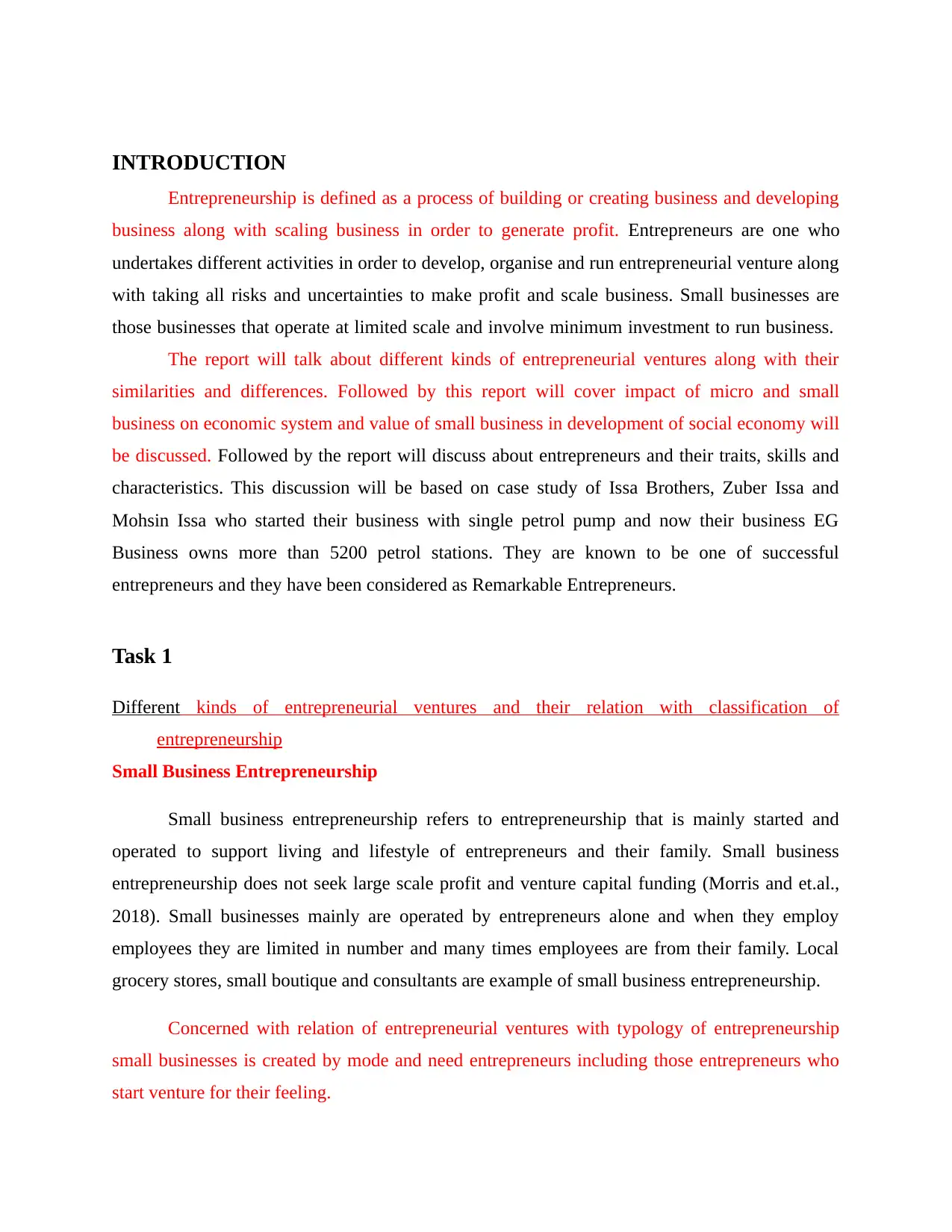
INTRODUCTION
Entrepreneurship is defined as a process of building or creating business and developing
business along with scaling business in order to generate profit. Entrepreneurs are one who
undertakes different activities in order to develop, organise and run entrepreneurial venture along
with taking all risks and uncertainties to make profit and scale business. Small businesses are
those businesses that operate at limited scale and involve minimum investment to run business.
The report will talk about different kinds of entrepreneurial ventures along with their
similarities and differences. Followed by this report will cover impact of micro and small
business on economic system and value of small business in development of social economy will
be discussed. Followed by the report will discuss about entrepreneurs and their traits, skills and
characteristics. This discussion will be based on case study of Issa Brothers, Zuber Issa and
Mohsin Issa who started their business with single petrol pump and now their business EG
Business owns more than 5200 petrol stations. They are known to be one of successful
entrepreneurs and they have been considered as Remarkable Entrepreneurs.
Task 1
Different kinds of entrepreneurial ventures and their relation with classification of
entrepreneurship
Small Business Entrepreneurship
Small business entrepreneurship refers to entrepreneurship that is mainly started and
operated to support living and lifestyle of entrepreneurs and their family. Small business
entrepreneurship does not seek large scale profit and venture capital funding (Morris and et.al.,
2018). Small businesses mainly are operated by entrepreneurs alone and when they employ
employees they are limited in number and many times employees are from their family. Local
grocery stores, small boutique and consultants are example of small business entrepreneurship.
Concerned with relation of entrepreneurial ventures with typology of entrepreneurship
small businesses is created by mode and need entrepreneurs including those entrepreneurs who
start venture for their feeling.
Entrepreneurship is defined as a process of building or creating business and developing
business along with scaling business in order to generate profit. Entrepreneurs are one who
undertakes different activities in order to develop, organise and run entrepreneurial venture along
with taking all risks and uncertainties to make profit and scale business. Small businesses are
those businesses that operate at limited scale and involve minimum investment to run business.
The report will talk about different kinds of entrepreneurial ventures along with their
similarities and differences. Followed by this report will cover impact of micro and small
business on economic system and value of small business in development of social economy will
be discussed. Followed by the report will discuss about entrepreneurs and their traits, skills and
characteristics. This discussion will be based on case study of Issa Brothers, Zuber Issa and
Mohsin Issa who started their business with single petrol pump and now their business EG
Business owns more than 5200 petrol stations. They are known to be one of successful
entrepreneurs and they have been considered as Remarkable Entrepreneurs.
Task 1
Different kinds of entrepreneurial ventures and their relation with classification of
entrepreneurship
Small Business Entrepreneurship
Small business entrepreneurship refers to entrepreneurship that is mainly started and
operated to support living and lifestyle of entrepreneurs and their family. Small business
entrepreneurship does not seek large scale profit and venture capital funding (Morris and et.al.,
2018). Small businesses mainly are operated by entrepreneurs alone and when they employ
employees they are limited in number and many times employees are from their family. Local
grocery stores, small boutique and consultants are example of small business entrepreneurship.
Concerned with relation of entrepreneurial ventures with typology of entrepreneurship
small businesses is created by mode and need entrepreneurs including those entrepreneurs who
start venture for their feeling.
⊘ This is a preview!⊘
Do you want full access?
Subscribe today to unlock all pages.

Trusted by 1+ million students worldwide
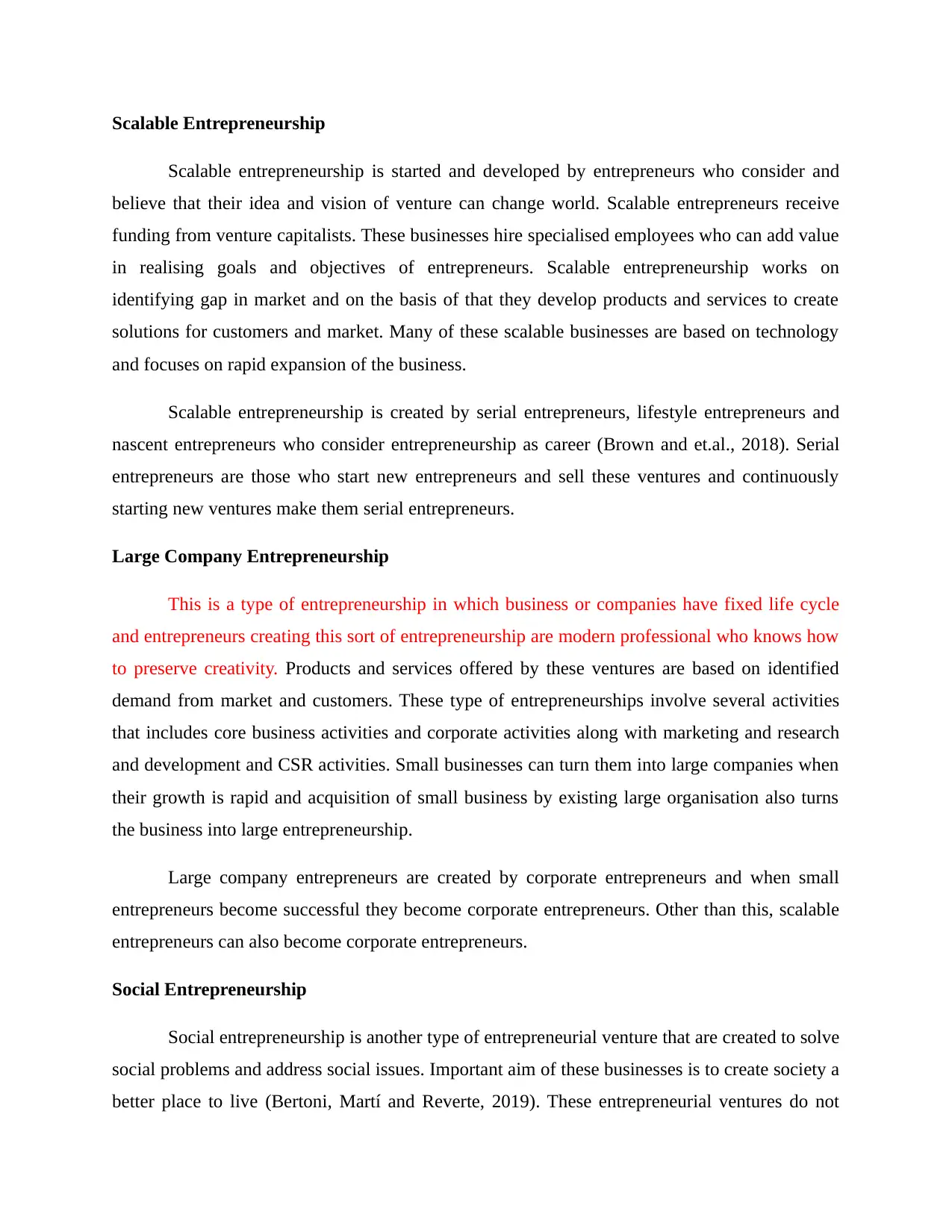
Scalable Entrepreneurship
Scalable entrepreneurship is started and developed by entrepreneurs who consider and
believe that their idea and vision of venture can change world. Scalable entrepreneurs receive
funding from venture capitalists. These businesses hire specialised employees who can add value
in realising goals and objectives of entrepreneurs. Scalable entrepreneurship works on
identifying gap in market and on the basis of that they develop products and services to create
solutions for customers and market. Many of these scalable businesses are based on technology
and focuses on rapid expansion of the business.
Scalable entrepreneurship is created by serial entrepreneurs, lifestyle entrepreneurs and
nascent entrepreneurs who consider entrepreneurship as career (Brown and et.al., 2018). Serial
entrepreneurs are those who start new entrepreneurs and sell these ventures and continuously
starting new ventures make them serial entrepreneurs.
Large Company Entrepreneurship
This is a type of entrepreneurship in which business or companies have fixed life cycle
and entrepreneurs creating this sort of entrepreneurship are modern professional who knows how
to preserve creativity. Products and services offered by these ventures are based on identified
demand from market and customers. These type of entrepreneurships involve several activities
that includes core business activities and corporate activities along with marketing and research
and development and CSR activities. Small businesses can turn them into large companies when
their growth is rapid and acquisition of small business by existing large organisation also turns
the business into large entrepreneurship.
Large company entrepreneurs are created by corporate entrepreneurs and when small
entrepreneurs become successful they become corporate entrepreneurs. Other than this, scalable
entrepreneurs can also become corporate entrepreneurs.
Social Entrepreneurship
Social entrepreneurship is another type of entrepreneurial venture that are created to solve
social problems and address social issues. Important aim of these businesses is to create society a
better place to live (Bertoni, Martí and Reverte, 2019). These entrepreneurial ventures do not
Scalable entrepreneurship is started and developed by entrepreneurs who consider and
believe that their idea and vision of venture can change world. Scalable entrepreneurs receive
funding from venture capitalists. These businesses hire specialised employees who can add value
in realising goals and objectives of entrepreneurs. Scalable entrepreneurship works on
identifying gap in market and on the basis of that they develop products and services to create
solutions for customers and market. Many of these scalable businesses are based on technology
and focuses on rapid expansion of the business.
Scalable entrepreneurship is created by serial entrepreneurs, lifestyle entrepreneurs and
nascent entrepreneurs who consider entrepreneurship as career (Brown and et.al., 2018). Serial
entrepreneurs are those who start new entrepreneurs and sell these ventures and continuously
starting new ventures make them serial entrepreneurs.
Large Company Entrepreneurship
This is a type of entrepreneurship in which business or companies have fixed life cycle
and entrepreneurs creating this sort of entrepreneurship are modern professional who knows how
to preserve creativity. Products and services offered by these ventures are based on identified
demand from market and customers. These type of entrepreneurships involve several activities
that includes core business activities and corporate activities along with marketing and research
and development and CSR activities. Small businesses can turn them into large companies when
their growth is rapid and acquisition of small business by existing large organisation also turns
the business into large entrepreneurship.
Large company entrepreneurs are created by corporate entrepreneurs and when small
entrepreneurs become successful they become corporate entrepreneurs. Other than this, scalable
entrepreneurs can also become corporate entrepreneurs.
Social Entrepreneurship
Social entrepreneurship is another type of entrepreneurial venture that are created to solve
social problems and address social issues. Important aim of these businesses is to create society a
better place to live (Bertoni, Martí and Reverte, 2019). These entrepreneurial ventures do not
Paraphrase This Document
Need a fresh take? Get an instant paraphrase of this document with our AI Paraphraser
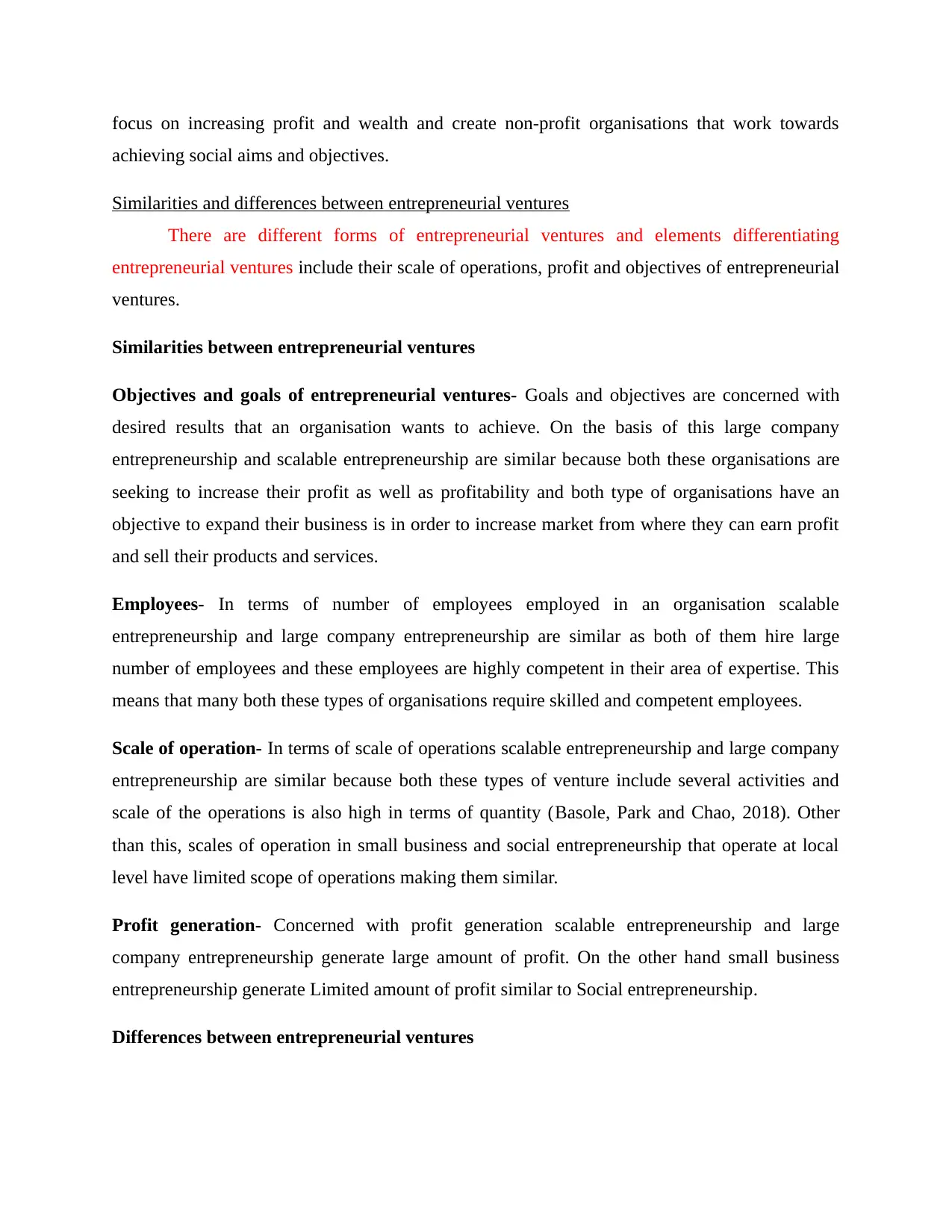
focus on increasing profit and wealth and create non-profit organisations that work towards
achieving social aims and objectives.
Similarities and differences between entrepreneurial ventures
There are different forms of entrepreneurial ventures and elements differentiating
entrepreneurial ventures include their scale of operations, profit and objectives of entrepreneurial
ventures.
Similarities between entrepreneurial ventures
Objectives and goals of entrepreneurial ventures- Goals and objectives are concerned with
desired results that an organisation wants to achieve. On the basis of this large company
entrepreneurship and scalable entrepreneurship are similar because both these organisations are
seeking to increase their profit as well as profitability and both type of organisations have an
objective to expand their business is in order to increase market from where they can earn profit
and sell their products and services.
Employees- In terms of number of employees employed in an organisation scalable
entrepreneurship and large company entrepreneurship are similar as both of them hire large
number of employees and these employees are highly competent in their area of expertise. This
means that many both these types of organisations require skilled and competent employees.
Scale of operation- In terms of scale of operations scalable entrepreneurship and large company
entrepreneurship are similar because both these types of venture include several activities and
scale of the operations is also high in terms of quantity (Basole, Park and Chao, 2018). Other
than this, scales of operation in small business and social entrepreneurship that operate at local
level have limited scope of operations making them similar.
Profit generation- Concerned with profit generation scalable entrepreneurship and large
company entrepreneurship generate large amount of profit. On the other hand small business
entrepreneurship generate Limited amount of profit similar to Social entrepreneurship.
Differences between entrepreneurial ventures
achieving social aims and objectives.
Similarities and differences between entrepreneurial ventures
There are different forms of entrepreneurial ventures and elements differentiating
entrepreneurial ventures include their scale of operations, profit and objectives of entrepreneurial
ventures.
Similarities between entrepreneurial ventures
Objectives and goals of entrepreneurial ventures- Goals and objectives are concerned with
desired results that an organisation wants to achieve. On the basis of this large company
entrepreneurship and scalable entrepreneurship are similar because both these organisations are
seeking to increase their profit as well as profitability and both type of organisations have an
objective to expand their business is in order to increase market from where they can earn profit
and sell their products and services.
Employees- In terms of number of employees employed in an organisation scalable
entrepreneurship and large company entrepreneurship are similar as both of them hire large
number of employees and these employees are highly competent in their area of expertise. This
means that many both these types of organisations require skilled and competent employees.
Scale of operation- In terms of scale of operations scalable entrepreneurship and large company
entrepreneurship are similar because both these types of venture include several activities and
scale of the operations is also high in terms of quantity (Basole, Park and Chao, 2018). Other
than this, scales of operation in small business and social entrepreneurship that operate at local
level have limited scope of operations making them similar.
Profit generation- Concerned with profit generation scalable entrepreneurship and large
company entrepreneurship generate large amount of profit. On the other hand small business
entrepreneurship generate Limited amount of profit similar to Social entrepreneurship.
Differences between entrepreneurial ventures
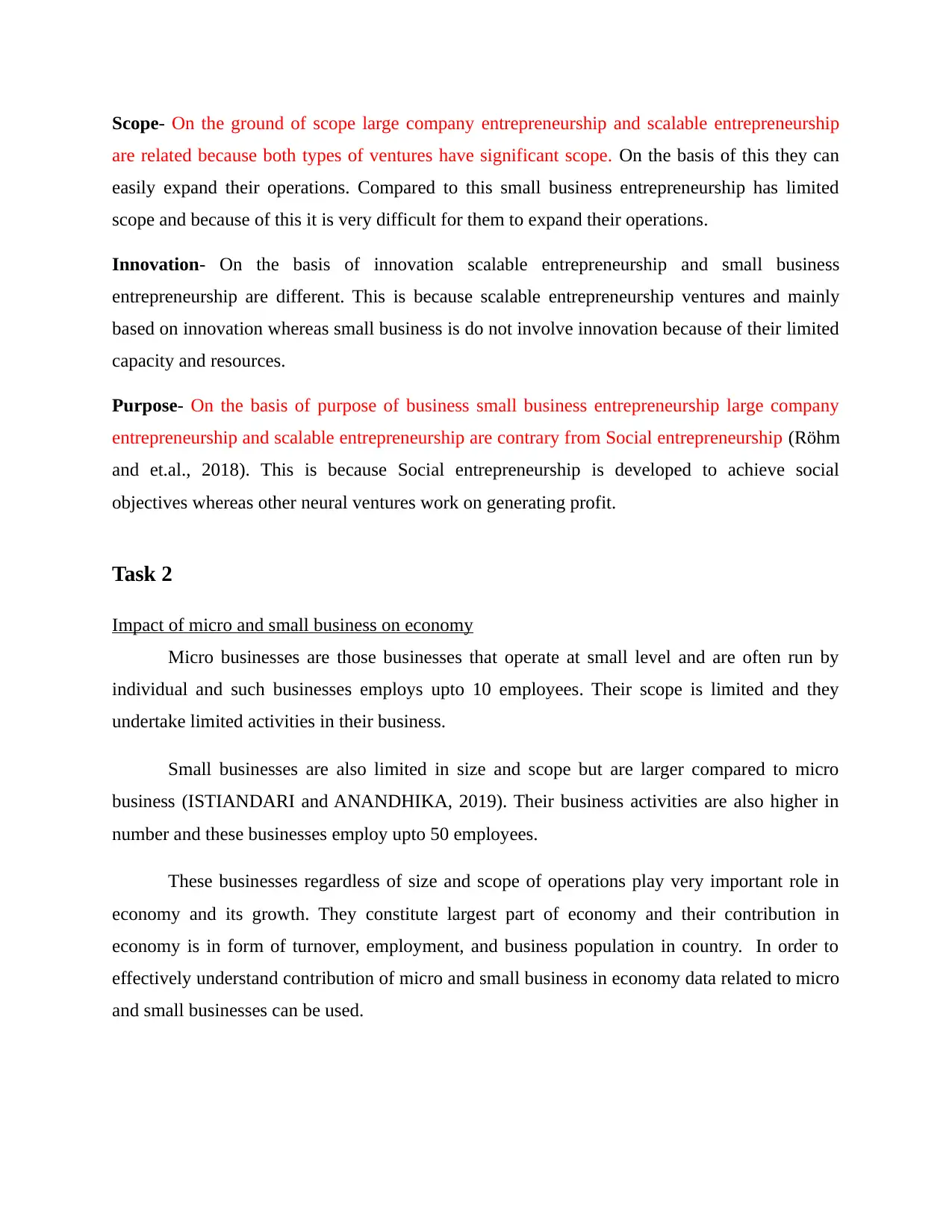
Scope- On the ground of scope large company entrepreneurship and scalable entrepreneurship
are related because both types of ventures have significant scope. On the basis of this they can
easily expand their operations. Compared to this small business entrepreneurship has limited
scope and because of this it is very difficult for them to expand their operations.
Innovation- On the basis of innovation scalable entrepreneurship and small business
entrepreneurship are different. This is because scalable entrepreneurship ventures and mainly
based on innovation whereas small business is do not involve innovation because of their limited
capacity and resources.
Purpose- On the basis of purpose of business small business entrepreneurship large company
entrepreneurship and scalable entrepreneurship are contrary from Social entrepreneurship (Röhm
and et.al., 2018). This is because Social entrepreneurship is developed to achieve social
objectives whereas other neural ventures work on generating profit.
Task 2
Impact of micro and small business on economy
Micro businesses are those businesses that operate at small level and are often run by
individual and such businesses employs upto 10 employees. Their scope is limited and they
undertake limited activities in their business.
Small businesses are also limited in size and scope but are larger compared to micro
business (ISTIANDARI and ANANDHIKA, 2019). Their business activities are also higher in
number and these businesses employ upto 50 employees.
These businesses regardless of size and scope of operations play very important role in
economy and its growth. They constitute largest part of economy and their contribution in
economy is in form of turnover, employment, and business population in country. In order to
effectively understand contribution of micro and small business in economy data related to micro
and small businesses can be used.
are related because both types of ventures have significant scope. On the basis of this they can
easily expand their operations. Compared to this small business entrepreneurship has limited
scope and because of this it is very difficult for them to expand their operations.
Innovation- On the basis of innovation scalable entrepreneurship and small business
entrepreneurship are different. This is because scalable entrepreneurship ventures and mainly
based on innovation whereas small business is do not involve innovation because of their limited
capacity and resources.
Purpose- On the basis of purpose of business small business entrepreneurship large company
entrepreneurship and scalable entrepreneurship are contrary from Social entrepreneurship (Röhm
and et.al., 2018). This is because Social entrepreneurship is developed to achieve social
objectives whereas other neural ventures work on generating profit.
Task 2
Impact of micro and small business on economy
Micro businesses are those businesses that operate at small level and are often run by
individual and such businesses employs upto 10 employees. Their scope is limited and they
undertake limited activities in their business.
Small businesses are also limited in size and scope but are larger compared to micro
business (ISTIANDARI and ANANDHIKA, 2019). Their business activities are also higher in
number and these businesses employ upto 50 employees.
These businesses regardless of size and scope of operations play very important role in
economy and its growth. They constitute largest part of economy and their contribution in
economy is in form of turnover, employment, and business population in country. In order to
effectively understand contribution of micro and small business in economy data related to micro
and small businesses can be used.
⊘ This is a preview!⊘
Do you want full access?
Subscribe today to unlock all pages.

Trusted by 1+ million students worldwide
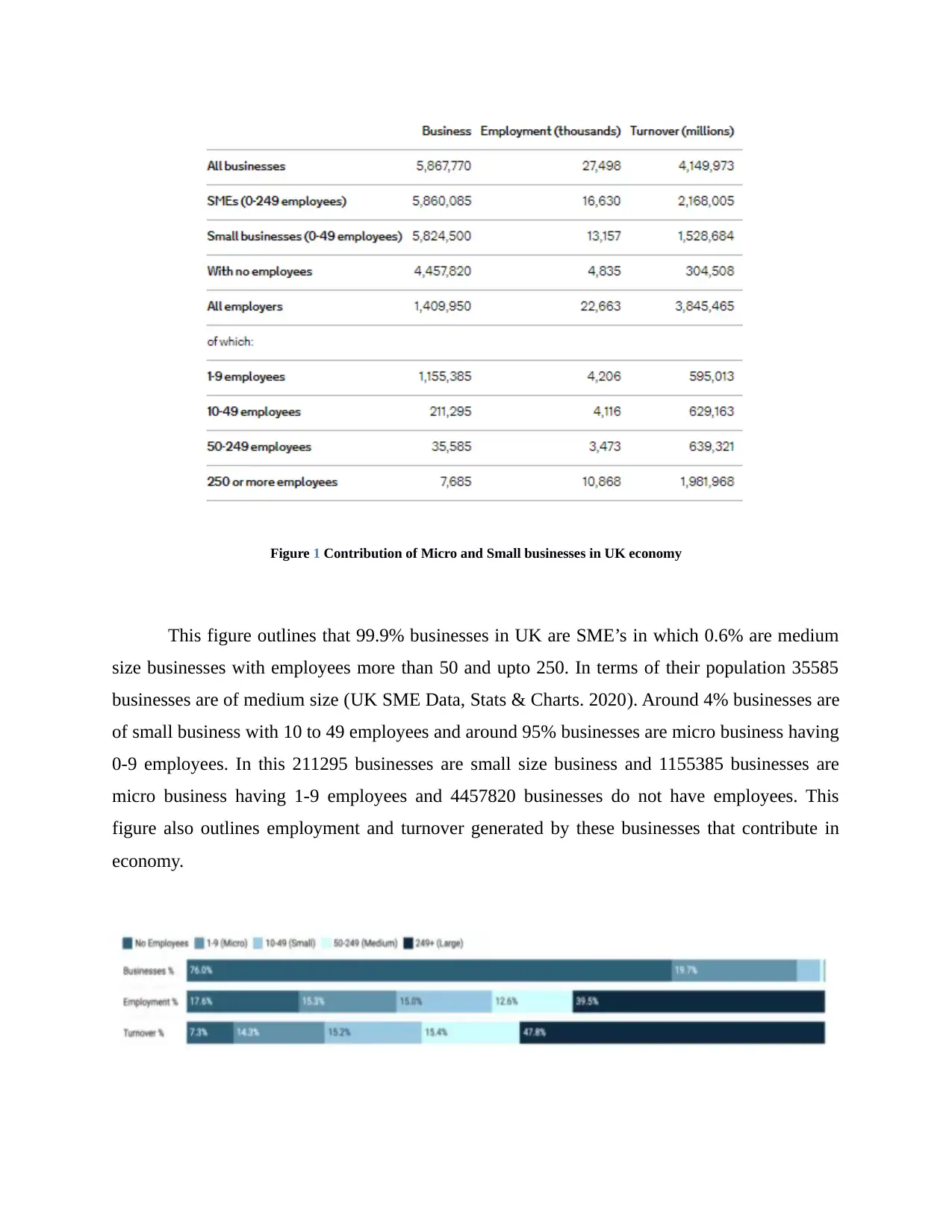
Figure 1 Contribution of Micro and Small businesses in UK economy
This figure outlines that 99.9% businesses in UK are SME’s in which 0.6% are medium
size businesses with employees more than 50 and upto 250. In terms of their population 35585
businesses are of medium size (UK SME Data, Stats & Charts. 2020). Around 4% businesses are
of small business with 10 to 49 employees and around 95% businesses are micro business having
0-9 employees. In this 211295 businesses are small size business and 1155385 businesses are
micro business having 1-9 employees and 4457820 businesses do not have employees. This
figure also outlines employment and turnover generated by these businesses that contribute in
economy.
This figure outlines that 99.9% businesses in UK are SME’s in which 0.6% are medium
size businesses with employees more than 50 and upto 250. In terms of their population 35585
businesses are of medium size (UK SME Data, Stats & Charts. 2020). Around 4% businesses are
of small business with 10 to 49 employees and around 95% businesses are micro business having
0-9 employees. In this 211295 businesses are small size business and 1155385 businesses are
micro business having 1-9 employees and 4457820 businesses do not have employees. This
figure also outlines employment and turnover generated by these businesses that contribute in
economy.
Paraphrase This Document
Need a fresh take? Get an instant paraphrase of this document with our AI Paraphraser
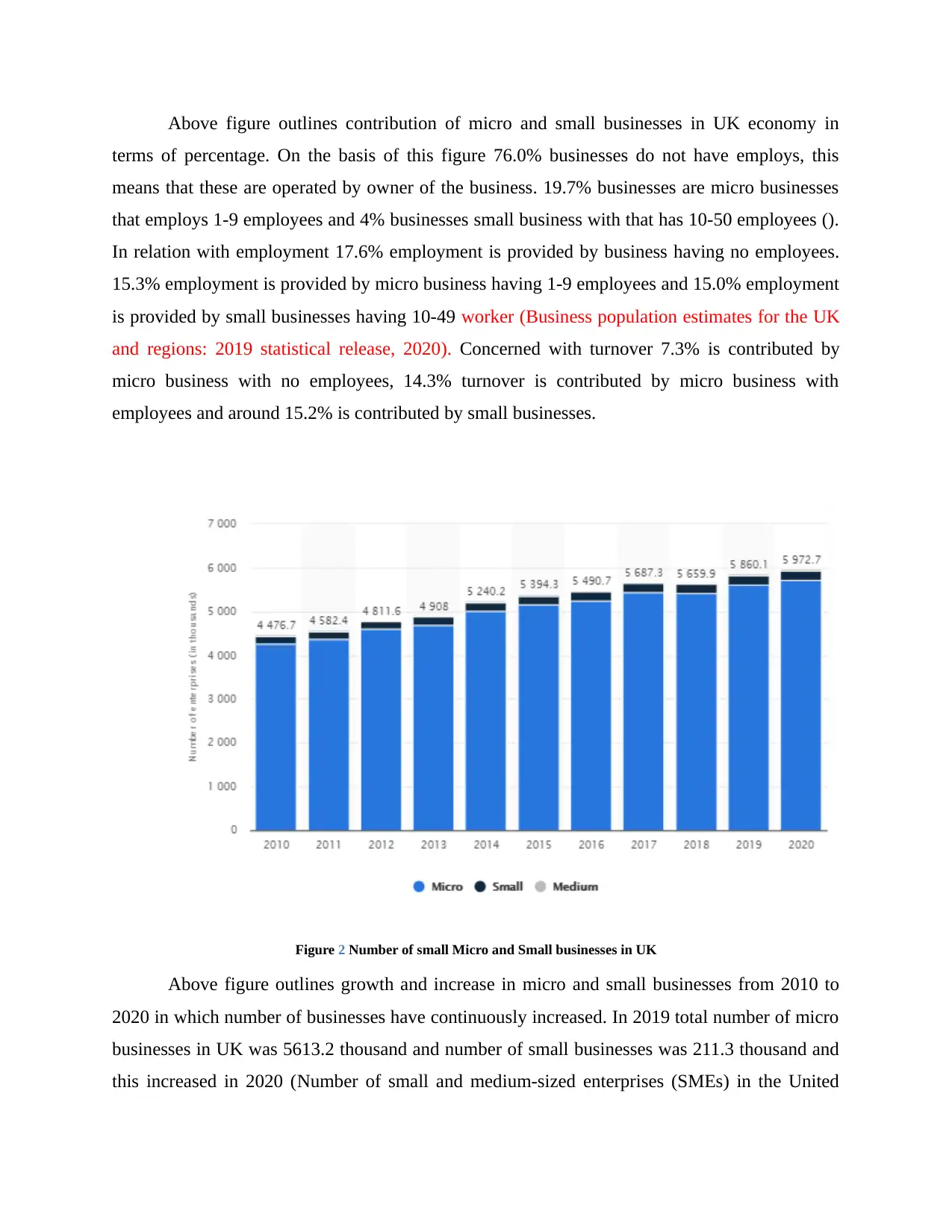
Above figure outlines contribution of micro and small businesses in UK economy in
terms of percentage. On the basis of this figure 76.0% businesses do not have employs, this
means that these are operated by owner of the business. 19.7% businesses are micro businesses
that employs 1-9 employees and 4% businesses small business with that has 10-50 employees ().
In relation with employment 17.6% employment is provided by business having no employees.
15.3% employment is provided by micro business having 1-9 employees and 15.0% employment
is provided by small businesses having 10-49 worker (Business population estimates for the UK
and regions: 2019 statistical release, 2020). Concerned with turnover 7.3% is contributed by
micro business with no employees, 14.3% turnover is contributed by micro business with
employees and around 15.2% is contributed by small businesses.
Figure 2 Number of small Micro and Small businesses in UK
Above figure outlines growth and increase in micro and small businesses from 2010 to
2020 in which number of businesses have continuously increased. In 2019 total number of micro
businesses in UK was 5613.2 thousand and number of small businesses was 211.3 thousand and
this increased in 2020 (Number of small and medium-sized enterprises (SMEs) in the United
terms of percentage. On the basis of this figure 76.0% businesses do not have employs, this
means that these are operated by owner of the business. 19.7% businesses are micro businesses
that employs 1-9 employees and 4% businesses small business with that has 10-50 employees ().
In relation with employment 17.6% employment is provided by business having no employees.
15.3% employment is provided by micro business having 1-9 employees and 15.0% employment
is provided by small businesses having 10-49 worker (Business population estimates for the UK
and regions: 2019 statistical release, 2020). Concerned with turnover 7.3% is contributed by
micro business with no employees, 14.3% turnover is contributed by micro business with
employees and around 15.2% is contributed by small businesses.
Figure 2 Number of small Micro and Small businesses in UK
Above figure outlines growth and increase in micro and small businesses from 2010 to
2020 in which number of businesses have continuously increased. In 2019 total number of micro
businesses in UK was 5613.2 thousand and number of small businesses was 211.3 thousand and
this increased in 2020 (Number of small and medium-sized enterprises (SMEs) in the United
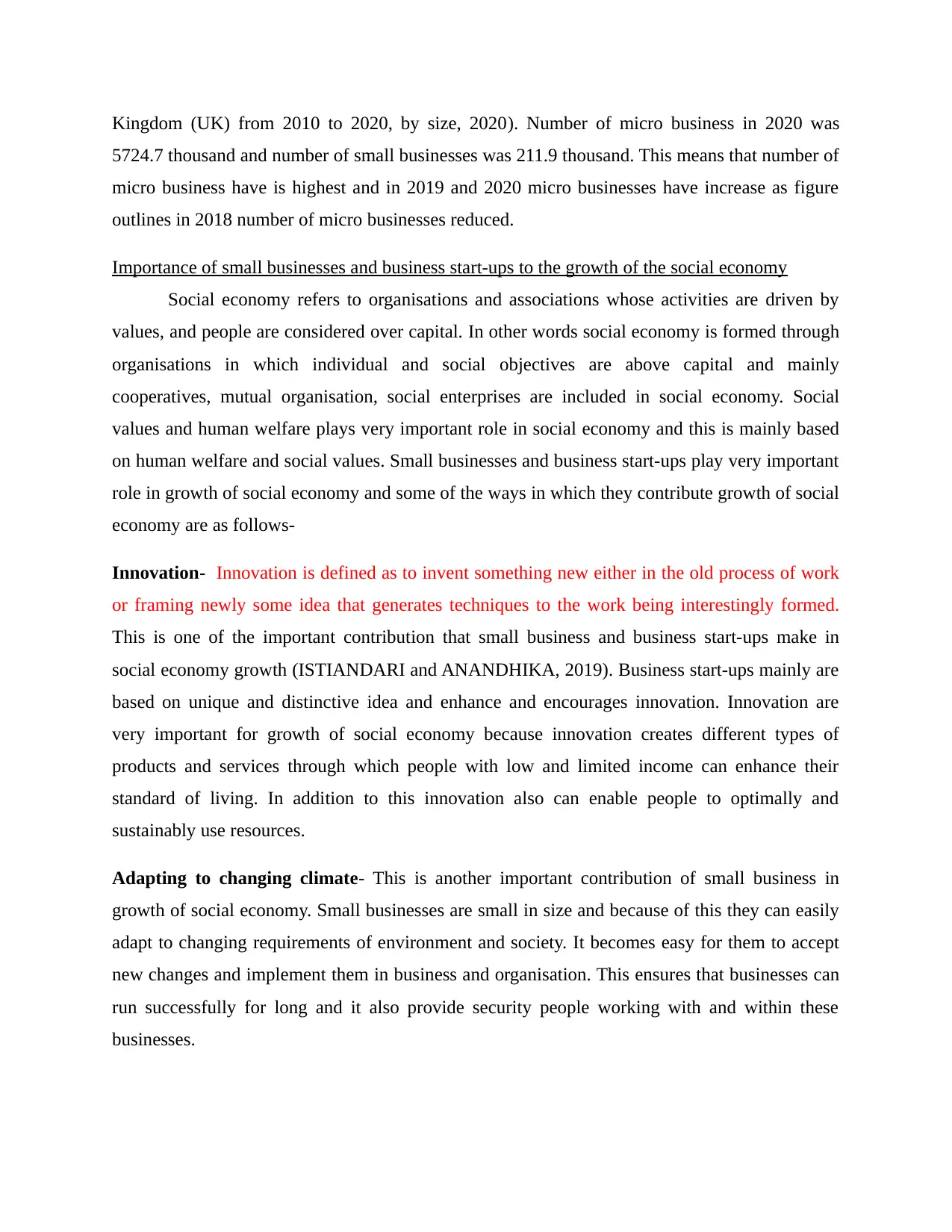
Kingdom (UK) from 2010 to 2020, by size, 2020). Number of micro business in 2020 was
5724.7 thousand and number of small businesses was 211.9 thousand. This means that number of
micro business have is highest and in 2019 and 2020 micro businesses have increase as figure
outlines in 2018 number of micro businesses reduced.
Importance of small businesses and business start-ups to the growth of the social economy
Social economy refers to organisations and associations whose activities are driven by
values, and people are considered over capital. In other words social economy is formed through
organisations in which individual and social objectives are above capital and mainly
cooperatives, mutual organisation, social enterprises are included in social economy. Social
values and human welfare plays very important role in social economy and this is mainly based
on human welfare and social values. Small businesses and business start-ups play very important
role in growth of social economy and some of the ways in which they contribute growth of social
economy are as follows-
Innovation- Innovation is defined as to invent something new either in the old process of work
or framing newly some idea that generates techniques to the work being interestingly formed.
This is one of the important contribution that small business and business start-ups make in
social economy growth (ISTIANDARI and ANANDHIKA, 2019). Business start-ups mainly are
based on unique and distinctive idea and enhance and encourages innovation. Innovation are
very important for growth of social economy because innovation creates different types of
products and services through which people with low and limited income can enhance their
standard of living. In addition to this innovation also can enable people to optimally and
sustainably use resources.
Adapting to changing climate- This is another important contribution of small business in
growth of social economy. Small businesses are small in size and because of this they can easily
adapt to changing requirements of environment and society. It becomes easy for them to accept
new changes and implement them in business and organisation. This ensures that businesses can
run successfully for long and it also provide security people working with and within these
businesses.
5724.7 thousand and number of small businesses was 211.9 thousand. This means that number of
micro business have is highest and in 2019 and 2020 micro businesses have increase as figure
outlines in 2018 number of micro businesses reduced.
Importance of small businesses and business start-ups to the growth of the social economy
Social economy refers to organisations and associations whose activities are driven by
values, and people are considered over capital. In other words social economy is formed through
organisations in which individual and social objectives are above capital and mainly
cooperatives, mutual organisation, social enterprises are included in social economy. Social
values and human welfare plays very important role in social economy and this is mainly based
on human welfare and social values. Small businesses and business start-ups play very important
role in growth of social economy and some of the ways in which they contribute growth of social
economy are as follows-
Innovation- Innovation is defined as to invent something new either in the old process of work
or framing newly some idea that generates techniques to the work being interestingly formed.
This is one of the important contribution that small business and business start-ups make in
social economy growth (ISTIANDARI and ANANDHIKA, 2019). Business start-ups mainly are
based on unique and distinctive idea and enhance and encourages innovation. Innovation are
very important for growth of social economy because innovation creates different types of
products and services through which people with low and limited income can enhance their
standard of living. In addition to this innovation also can enable people to optimally and
sustainably use resources.
Adapting to changing climate- This is another important contribution of small business in
growth of social economy. Small businesses are small in size and because of this they can easily
adapt to changing requirements of environment and society. It becomes easy for them to accept
new changes and implement them in business and organisation. This ensures that businesses can
run successfully for long and it also provide security people working with and within these
businesses.
⊘ This is a preview!⊘
Do you want full access?
Subscribe today to unlock all pages.

Trusted by 1+ million students worldwide
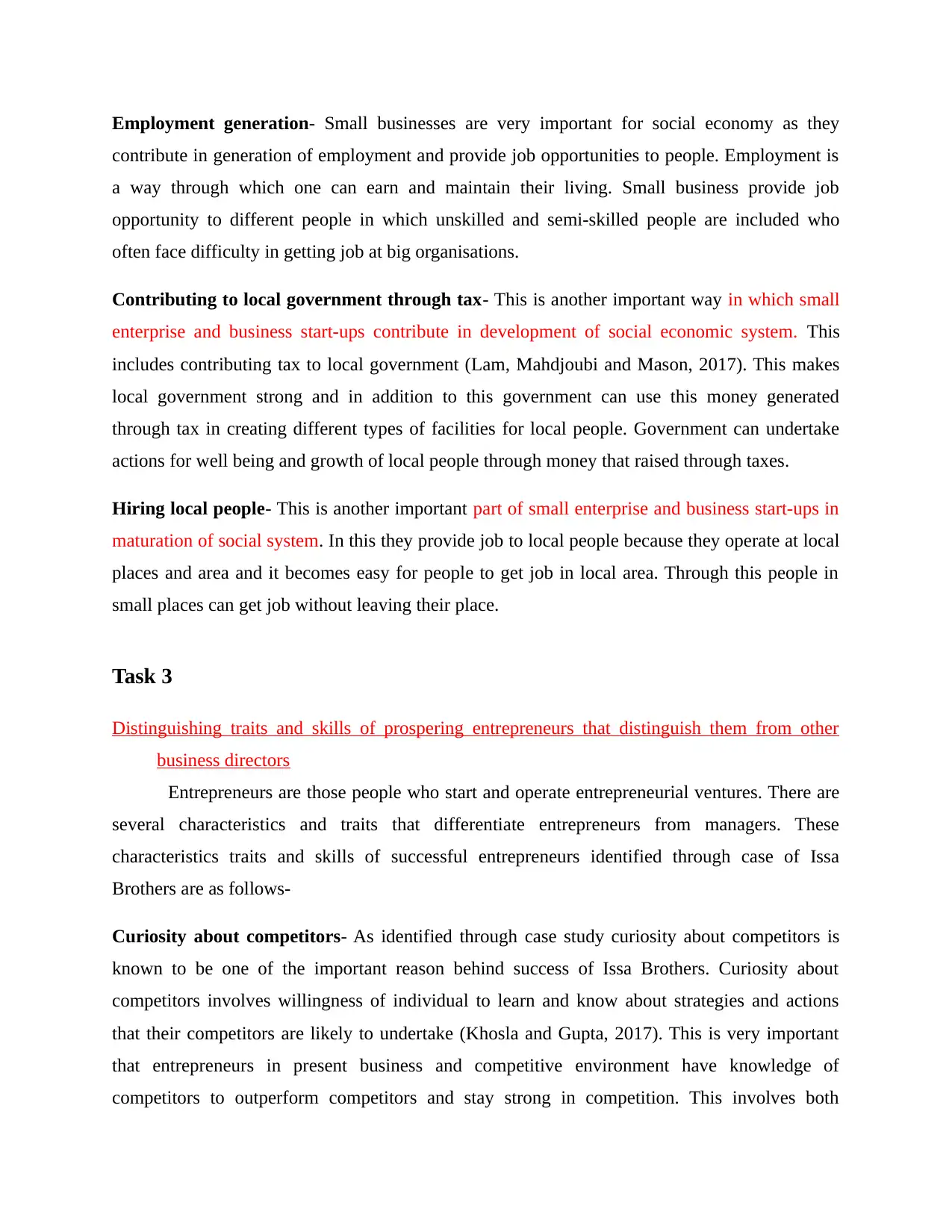
Employment generation- Small businesses are very important for social economy as they
contribute in generation of employment and provide job opportunities to people. Employment is
a way through which one can earn and maintain their living. Small business provide job
opportunity to different people in which unskilled and semi-skilled people are included who
often face difficulty in getting job at big organisations.
Contributing to local government through tax- This is another important way in which small
enterprise and business start-ups contribute in development of social economic system. This
includes contributing tax to local government (Lam, Mahdjoubi and Mason, 2017). This makes
local government strong and in addition to this government can use this money generated
through tax in creating different types of facilities for local people. Government can undertake
actions for well being and growth of local people through money that raised through taxes.
Hiring local people- This is another important part of small enterprise and business start-ups in
maturation of social system. In this they provide job to local people because they operate at local
places and area and it becomes easy for people to get job in local area. Through this people in
small places can get job without leaving their place.
Task 3
Distinguishing traits and skills of prospering entrepreneurs that distinguish them from other
business directors
Entrepreneurs are those people who start and operate entrepreneurial ventures. There are
several characteristics and traits that differentiate entrepreneurs from managers. These
characteristics traits and skills of successful entrepreneurs identified through case of Issa
Brothers are as follows-
Curiosity about competitors- As identified through case study curiosity about competitors is
known to be one of the important reason behind success of Issa Brothers. Curiosity about
competitors involves willingness of individual to learn and know about strategies and actions
that their competitors are likely to undertake (Khosla and Gupta, 2017). This is very important
that entrepreneurs in present business and competitive environment have knowledge of
competitors to outperform competitors and stay strong in competition. This involves both
contribute in generation of employment and provide job opportunities to people. Employment is
a way through which one can earn and maintain their living. Small business provide job
opportunity to different people in which unskilled and semi-skilled people are included who
often face difficulty in getting job at big organisations.
Contributing to local government through tax- This is another important way in which small
enterprise and business start-ups contribute in development of social economic system. This
includes contributing tax to local government (Lam, Mahdjoubi and Mason, 2017). This makes
local government strong and in addition to this government can use this money generated
through tax in creating different types of facilities for local people. Government can undertake
actions for well being and growth of local people through money that raised through taxes.
Hiring local people- This is another important part of small enterprise and business start-ups in
maturation of social system. In this they provide job to local people because they operate at local
places and area and it becomes easy for people to get job in local area. Through this people in
small places can get job without leaving their place.
Task 3
Distinguishing traits and skills of prospering entrepreneurs that distinguish them from other
business directors
Entrepreneurs are those people who start and operate entrepreneurial ventures. There are
several characteristics and traits that differentiate entrepreneurs from managers. These
characteristics traits and skills of successful entrepreneurs identified through case of Issa
Brothers are as follows-
Curiosity about competitors- As identified through case study curiosity about competitors is
known to be one of the important reason behind success of Issa Brothers. Curiosity about
competitors involves willingness of individual to learn and know about strategies and actions
that their competitors are likely to undertake (Khosla and Gupta, 2017). This is very important
that entrepreneurs in present business and competitive environment have knowledge of
competitors to outperform competitors and stay strong in competition. This involves both
Paraphrase This Document
Need a fresh take? Get an instant paraphrase of this document with our AI Paraphraser
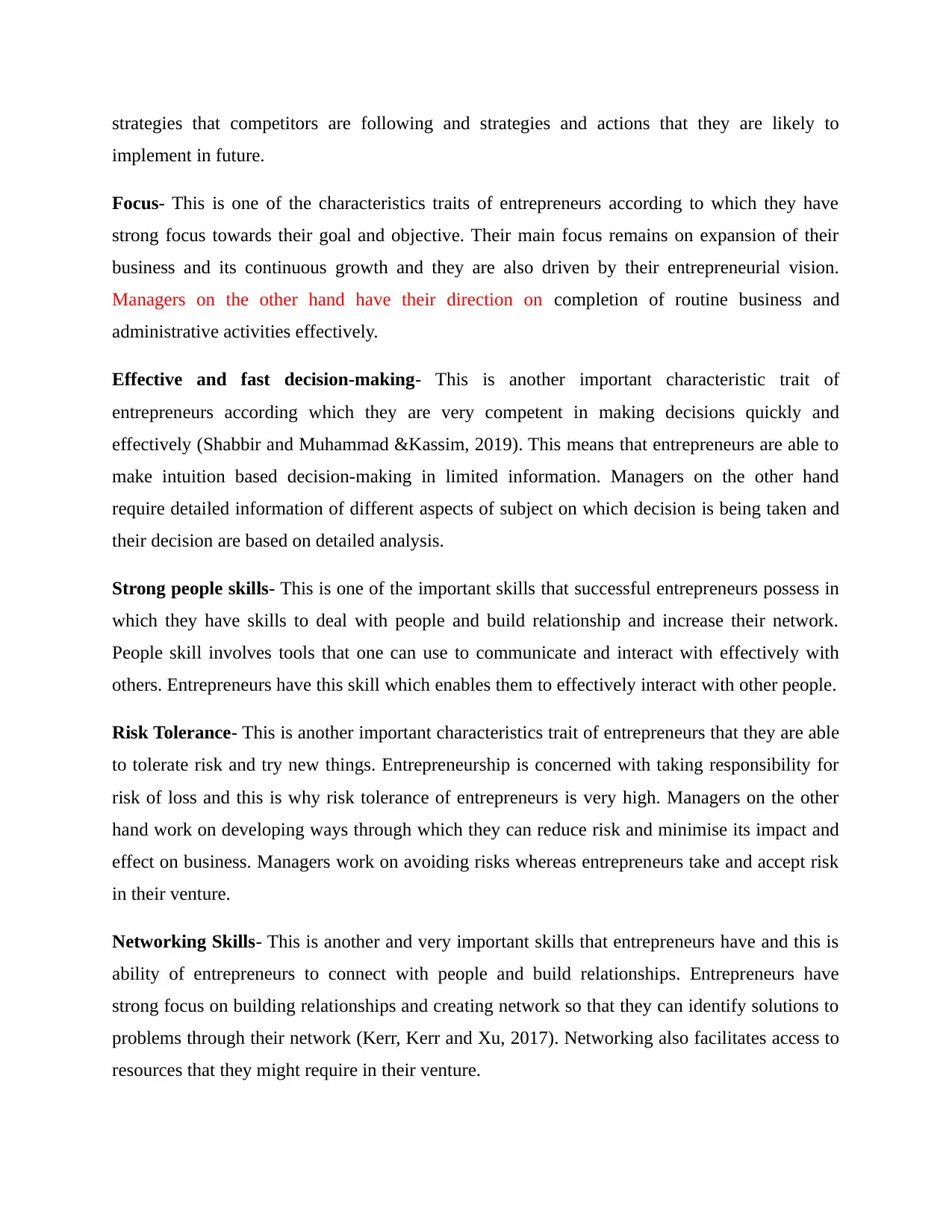
strategies that competitors are following and strategies and actions that they are likely to
implement in future.
Focus- This is one of the characteristics traits of entrepreneurs according to which they have
strong focus towards their goal and objective. Their main focus remains on expansion of their
business and its continuous growth and they are also driven by their entrepreneurial vision.
Managers on the other hand have their direction on completion of routine business and
administrative activities effectively.
Effective and fast decision-making- This is another important characteristic trait of
entrepreneurs according which they are very competent in making decisions quickly and
effectively (Shabbir and Muhammad &Kassim, 2019). This means that entrepreneurs are able to
make intuition based decision-making in limited information. Managers on the other hand
require detailed information of different aspects of subject on which decision is being taken and
their decision are based on detailed analysis.
Strong people skills- This is one of the important skills that successful entrepreneurs possess in
which they have skills to deal with people and build relationship and increase their network.
People skill involves tools that one can use to communicate and interact with effectively with
others. Entrepreneurs have this skill which enables them to effectively interact with other people.
Risk Tolerance- This is another important characteristics trait of entrepreneurs that they are able
to tolerate risk and try new things. Entrepreneurship is concerned with taking responsibility for
risk of loss and this is why risk tolerance of entrepreneurs is very high. Managers on the other
hand work on developing ways through which they can reduce risk and minimise its impact and
effect on business. Managers work on avoiding risks whereas entrepreneurs take and accept risk
in their venture.
Networking Skills- This is another and very important skills that entrepreneurs have and this is
ability of entrepreneurs to connect with people and build relationships. Entrepreneurs have
strong focus on building relationships and creating network so that they can identify solutions to
problems through their network (Kerr, Kerr and Xu, 2017). Networking also facilitates access to
resources that they might require in their venture.
implement in future.
Focus- This is one of the characteristics traits of entrepreneurs according to which they have
strong focus towards their goal and objective. Their main focus remains on expansion of their
business and its continuous growth and they are also driven by their entrepreneurial vision.
Managers on the other hand have their direction on completion of routine business and
administrative activities effectively.
Effective and fast decision-making- This is another important characteristic trait of
entrepreneurs according which they are very competent in making decisions quickly and
effectively (Shabbir and Muhammad &Kassim, 2019). This means that entrepreneurs are able to
make intuition based decision-making in limited information. Managers on the other hand
require detailed information of different aspects of subject on which decision is being taken and
their decision are based on detailed analysis.
Strong people skills- This is one of the important skills that successful entrepreneurs possess in
which they have skills to deal with people and build relationship and increase their network.
People skill involves tools that one can use to communicate and interact with effectively with
others. Entrepreneurs have this skill which enables them to effectively interact with other people.
Risk Tolerance- This is another important characteristics trait of entrepreneurs that they are able
to tolerate risk and try new things. Entrepreneurship is concerned with taking responsibility for
risk of loss and this is why risk tolerance of entrepreneurs is very high. Managers on the other
hand work on developing ways through which they can reduce risk and minimise its impact and
effect on business. Managers work on avoiding risks whereas entrepreneurs take and accept risk
in their venture.
Networking Skills- This is another and very important skills that entrepreneurs have and this is
ability of entrepreneurs to connect with people and build relationships. Entrepreneurs have
strong focus on building relationships and creating network so that they can identify solutions to
problems through their network (Kerr, Kerr and Xu, 2017). Networking also facilitates access to
resources that they might require in their venture.
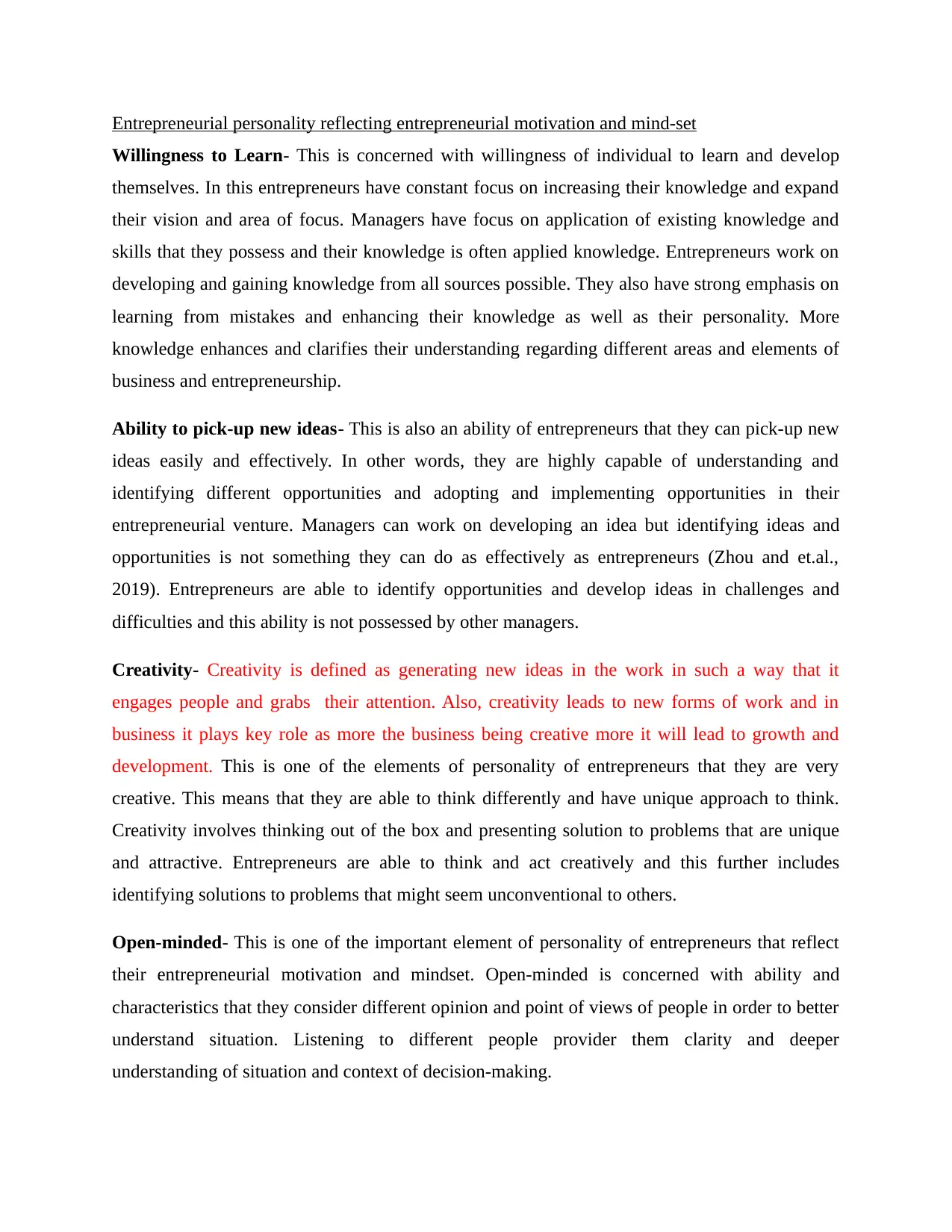
Entrepreneurial personality reflecting entrepreneurial motivation and mind-set
Willingness to Learn- This is concerned with willingness of individual to learn and develop
themselves. In this entrepreneurs have constant focus on increasing their knowledge and expand
their vision and area of focus. Managers have focus on application of existing knowledge and
skills that they possess and their knowledge is often applied knowledge. Entrepreneurs work on
developing and gaining knowledge from all sources possible. They also have strong emphasis on
learning from mistakes and enhancing their knowledge as well as their personality. More
knowledge enhances and clarifies their understanding regarding different areas and elements of
business and entrepreneurship.
Ability to pick-up new ideas- This is also an ability of entrepreneurs that they can pick-up new
ideas easily and effectively. In other words, they are highly capable of understanding and
identifying different opportunities and adopting and implementing opportunities in their
entrepreneurial venture. Managers can work on developing an idea but identifying ideas and
opportunities is not something they can do as effectively as entrepreneurs (Zhou and et.al.,
2019). Entrepreneurs are able to identify opportunities and develop ideas in challenges and
difficulties and this ability is not possessed by other managers.
Creativity- Creativity is defined as generating new ideas in the work in such a way that it
engages people and grabs their attention. Also, creativity leads to new forms of work and in
business it plays key role as more the business being creative more it will lead to growth and
development. This is one of the elements of personality of entrepreneurs that they are very
creative. This means that they are able to think differently and have unique approach to think.
Creativity involves thinking out of the box and presenting solution to problems that are unique
and attractive. Entrepreneurs are able to think and act creatively and this further includes
identifying solutions to problems that might seem unconventional to others.
Open-minded- This is one of the important element of personality of entrepreneurs that reflect
their entrepreneurial motivation and mindset. Open-minded is concerned with ability and
characteristics that they consider different opinion and point of views of people in order to better
understand situation. Listening to different people provider them clarity and deeper
understanding of situation and context of decision-making.
Willingness to Learn- This is concerned with willingness of individual to learn and develop
themselves. In this entrepreneurs have constant focus on increasing their knowledge and expand
their vision and area of focus. Managers have focus on application of existing knowledge and
skills that they possess and their knowledge is often applied knowledge. Entrepreneurs work on
developing and gaining knowledge from all sources possible. They also have strong emphasis on
learning from mistakes and enhancing their knowledge as well as their personality. More
knowledge enhances and clarifies their understanding regarding different areas and elements of
business and entrepreneurship.
Ability to pick-up new ideas- This is also an ability of entrepreneurs that they can pick-up new
ideas easily and effectively. In other words, they are highly capable of understanding and
identifying different opportunities and adopting and implementing opportunities in their
entrepreneurial venture. Managers can work on developing an idea but identifying ideas and
opportunities is not something they can do as effectively as entrepreneurs (Zhou and et.al.,
2019). Entrepreneurs are able to identify opportunities and develop ideas in challenges and
difficulties and this ability is not possessed by other managers.
Creativity- Creativity is defined as generating new ideas in the work in such a way that it
engages people and grabs their attention. Also, creativity leads to new forms of work and in
business it plays key role as more the business being creative more it will lead to growth and
development. This is one of the elements of personality of entrepreneurs that they are very
creative. This means that they are able to think differently and have unique approach to think.
Creativity involves thinking out of the box and presenting solution to problems that are unique
and attractive. Entrepreneurs are able to think and act creatively and this further includes
identifying solutions to problems that might seem unconventional to others.
Open-minded- This is one of the important element of personality of entrepreneurs that reflect
their entrepreneurial motivation and mindset. Open-minded is concerned with ability and
characteristics that they consider different opinion and point of views of people in order to better
understand situation. Listening to different people provider them clarity and deeper
understanding of situation and context of decision-making.
⊘ This is a preview!⊘
Do you want full access?
Subscribe today to unlock all pages.

Trusted by 1+ million students worldwide
1 out of 18
Related Documents
Your All-in-One AI-Powered Toolkit for Academic Success.
+13062052269
info@desklib.com
Available 24*7 on WhatsApp / Email
![[object Object]](/_next/static/media/star-bottom.7253800d.svg)
Unlock your academic potential
Copyright © 2020–2025 A2Z Services. All Rights Reserved. Developed and managed by ZUCOL.





